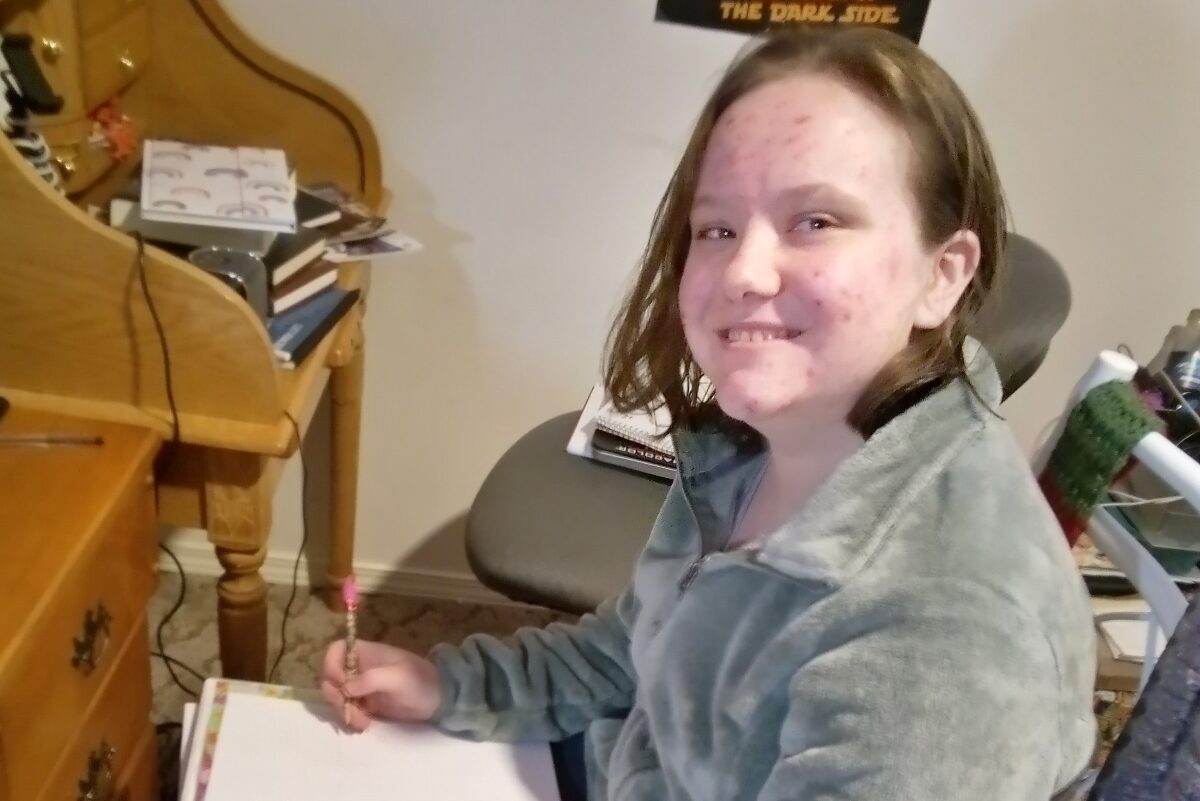Picture a superhero. Perhaps this prompt conjures visions of rippling muscles encased in tight body suits. Perhaps a flowing cape and a mask of anonymity. Maybe you picture a powerful individual mustering all his or her powers to overcome the utterly impossible.
And for the most part, you’d be absolutely spot on. If we set aside physique and spandex, a superhero can be someone as ordinary as a teenage girl trying to complete her education and find a pathway to a rewarding career. A young woman just itching to be challenged and test her mettle against all that is supposed to be impossible.
 Matilda McDaniel, recent graduate of the Adult Education Center’s high school equivalency program, fits precisely this cut of a superhero.
Matilda McDaniel, recent graduate of the Adult Education Center’s high school equivalency program, fits precisely this cut of a superhero.
“The high school I was going to…it felt like everything was too easy,” Mati explains. “It felt like I had learned more in middle school than in high school. And I was starting to wonder, even though I was getting straight A’s…I was getting worried that I couldn’t even get a GED if I tried. So I dropped out.”
In 2020, as the Coronavirus pandemic lagged on, Mati enrolled in the AEC’s online classes. As her teachers, Mary Mullen and Deb Pace, prepared her for the GED math and science tests, Mati discovered the challenge she’d been craving.
In particular, she struggled with science vocabulary and concepts. As she recalls, “With all the different vocabulary words, it’s hard to remember all the concepts. They can sound so similar. But it’s still interesting.”
Mati also found plenty of trials in math equations. She notes, “Every now and then I write my sevens, twos, and ones similar. Then it’s like…oh wait—that was the wrong number!”
Fortunately, not even these minor annoyances could dampen Mati’s zeal for math. “I like math a lot because it’s fun, but it’s my lowest score because I mess up on different numbers, but it’s still fun. So math’s my favorite, but it’s just the one I’m worst at. I guess that’s ironic,” she laughs.
For some people, struggling with terminology or making computational errors could prove too discouraging. Consider how easy it is to give up on going to the gym as a New Year’s resolution, let alone finishing one’s education.
Mati, however, relished the difficulties because they were proof that she was on track. “I felt like I was learning again. I liked that. It wasn’t just a bunch of sitting around doing nothing. You got to go through and get stuff done and learn,” she says.
By the close of 2021, Mati had successfully passed all four of the GED subject tests. Now that she possesses an equivalent high school diploma, she is eager to gain some practical work experience.
“I’d like to get a job but it has to be in walking distance of the house,” she says. Unfortunately, transportation poses a substantial obstacle as the household shares one vehicle.

Example of graphic novel artistry.
Gazing beyond the immediate and practical job experience every teenager needs, Mati envisions an ambitious career in publishing. She muses, “If I were to do a dream job, I’d like to be an author/illustrator.”
Having grown up on a healthy diet of superhero movies, Mati yearns to produce the massively popular graphic novels that combine masterful illustrations with written text. Imagine movie scripts with pictures. While plenty of creators attend specialized art schools to train as graphic novelists, many of the field’s founding innovators—the likes of Scott McCloud and Alan Moore—were initially self-taught.
Mati already fits in well with those icons. If she cannot find the knowledge she seeks in school, she has already shown herself capable of mustering all her talents and using them as her super power to succeed.
Spring registration for the High School Equivalency and English-as-a-Second-Language programs opens March 7th. For more information, contact Angie Cohen, Durango’s Student Services Specialist at 970-385-4354, or Janae Jensen, Cortez’s Student Services Specialist, at 970-564-7004. Or, send questions to info@durangoadulted.org.


